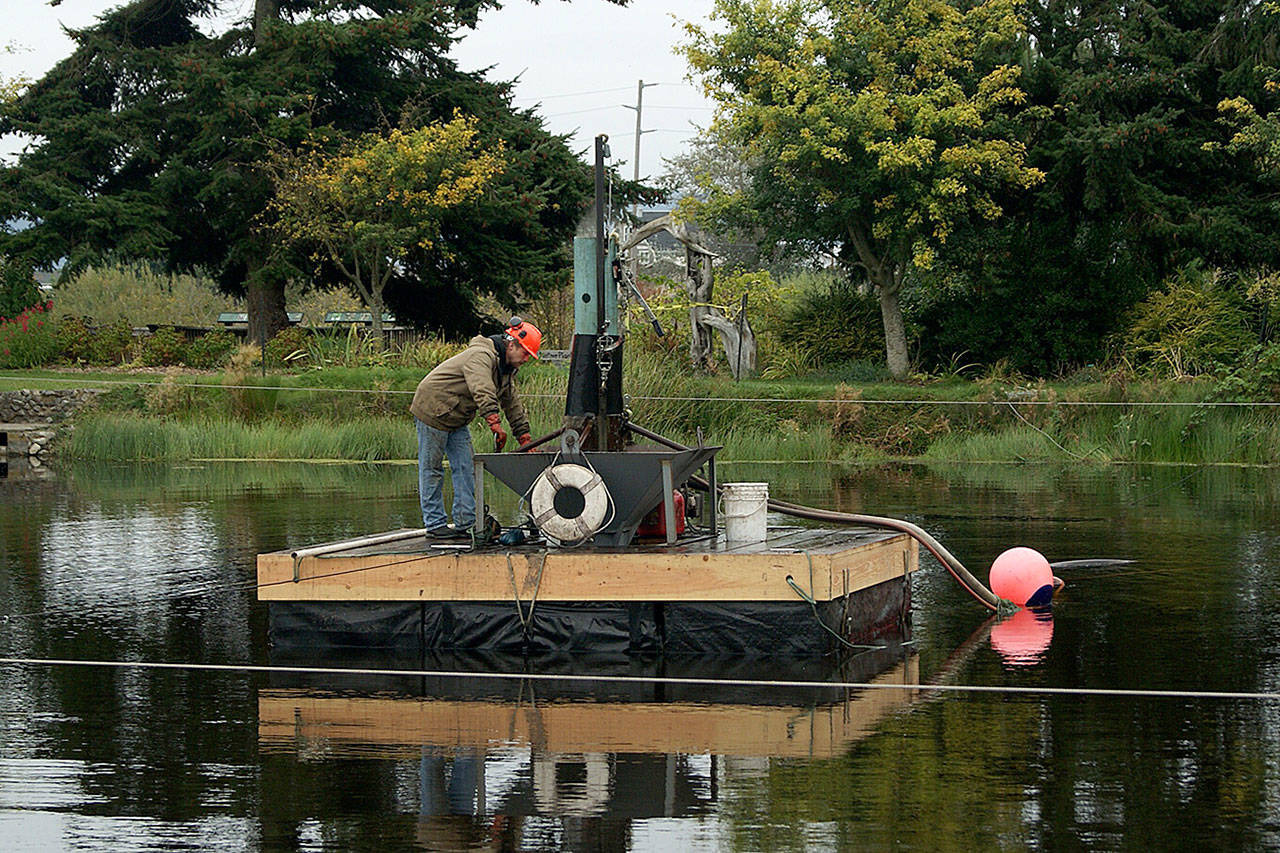Stinky, slimy goose poop has accumulated over the years at the bottom of the small pond at Greenbank Farm. It’s sat there for years, undisturbed.
Until now.
The Port of Coupeville is funding a clean-up effort using a machine invented by Freeland local Tony Frantz, in partnership with Ken Petry of Petry Custom Land Prep.
The goose and duck poop was posing a hazard to the farm’s fire suppression inlet pipe, and the port wanted clean water that wouldn’t clog filters when used for agriculture.
The machine started running daily over two weeks ago in the roughly 10-foot deep pond and is sucking up thousands of pounds of waste. Over 60 trucks full of goose poop and other sediment have been driven a short distance to the farm’s grassy field to be sprayed out as watery fertilizer.
“The health and vitality of this historic farm has many needs, the pond restoration was at the top of our list and has been in need for over five years,” Port of Coupeville Executive Director Chris Michalopoulos said in an email. “With potential farming programs on the horizon, and with the need for clean fire suppression water for the historic barn, this was a high priority for this year.”
The project is being funded through an Island County Rural Economic Development Grant, which was $46,000. The final cost for the project ended up being about $39,900, Michalopoulos said, of which the Port of Coupeville is responsible for 10 percent, or about $3,990.
The Port of Coupeville received two bids to complete the project, Michalopoulos said. The rejected bid’s approach to the project would have been to drain the pond completely, let it dry out during the summer and place the removed sediment in trucks to be used as fertilizer after a year. It was a much more costly and impactful route, Michalopoulos said.
Frantz first came up with the idea for his filtering machine, called a “creosote piling and sediment extractor,” 17 years ago, he said. It only took him one try to create his invention. Rather than using mechanical moving parts, it functions using a hydraulic and pneumatic system.
“With the first model, it was perfect,” he said. Larger-scale versions of his machine have also been built and used in places such as Port Angeles by the state’s Department of Natural Resources in 2016.
Frantz has been involved in numerous environmental cleanup projects, such as a 2006 project at Lake Hancock, where creosote-soaked logs were removed from the beach.
He’s also spent years trying to raise awareness of the dangers of creosote, he said, including talking to politicians.
“Now, creosote’s being cleaned up all around Puget Sound,” he said.
Creosote is found in aging docks, telephone poles and other wooden structures, and his machine has the ability to remove it from the water. The cancer-causing, hazardous chemical was used as a wood preservative before its health risks became known. It’s also hazardous to animals, including orcas and fish, he said.
Frantz used to work building structures made with creosote-treated wood, but became sick from exposure.
“I got poisoned by the creosote,” he said. “I can’t be around it anymore.”
An article published in the South Whidbey Record this past March alerted him to the Port’s need of a process to clean up the pond.
Frantz said he believed he was up to the task, and enlisted the help of his longtime friend, Petry, who was at first skeptical of the project but then was convinced by Frantz that they could do it.
“It’s been going well,” Petry said, and his son, Colten Petry agreed.
Even though the filtered pond will be clean enough to swim in, one probably wouldn’t want to — they’ve found two big leeches so far, Frantz said, and one was eight inches long and the other was four inches.
Even though they’re working with poop, there’s no smell — it’s contained to a small venting pipe that releases any gasses.
“This is the cleanest operation for something so dirty,” Frantz said.



